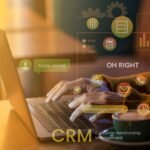Salesforce is rated the best CRM in the world, but to realize its full potential, businesses must properly manage it. While each organization is unique, many universal best practices can help businesses in all industries. Salesforce should be a part of any SaaS platform. It’s the only way to make sure your users have access to the mission-critical data they need when they need it. SaaS companies need Salesforce CRM as the foundation for managing complex sales cycles, decreasing churn, and allowing the Sales team to complete deals faster.
The fact that so much work is done online is a distinguishing feature of SaaS businesses. Salesforce is cloud-based, which makes it simple to integrate with current company systems using APIs and integration mechanisms.
Does your SaaS company need Salesforce CRM?
Is it possible to buy your product in an offline store? Is your product on a longer-than-weekly sales cycle? Do you have a sales crew that works exclusively for you? Is your service based on a monthly subscription? Is customer service necessary for your product? These are some of the questions you should ask yourself when evaluating whether SaaS companies need Salesforce.Is it possible to buy your product in an offline store?
Consider your sales process when determining whether or not your business needs a CRM. If you’re selling a B2B enterprise tool that costs tens of thousands of dollars, you will need a CRM at several points during the sales process. It’s very likely that some of your consumers will buy based on conversations you’ve had with them, signing a contract, and receiving an invoice. Salesforce CRM will help you monitor your initial contact with a customer through to the day the sale is closed.Is your product on a longer-than-weekly sales cycle and if so how dedicated is your sales team
The customer lifecycle is far more sophisticated than we previously imagined to be true. Customers research items for months before they are spotted in the typical lifecycle. It could take over a year to close a deal, and there could be dozens of phone calls and emails between various personnel from both companies during that time. Your sales team can observe potential customers from the first point of contact, establish a connection with them, and get an all-around view of their company using Salesforce CRM. The CRM will also preserve all of those conversations as part of a unified system of record to ensure that the opportunity progresses smoothly through the sales funnel, client demands aren’t overlooked, and the contract accurately reflects what was agreed upon verbally. Customer Success can use that information to put what Sales agreed on into action after they become paying customers.Is your service based on a monthly subscription?
Many SaaS businesses are killed by churn. Renewals cannot be taken for granted, especially for SaaS businesses. If your product is based on a subscription model, making sure renewals happen should always be a priority. Many businesses believe a five percent monthly churn rate is acceptable, despite the fact that they are losing over forty of their customers each year. Not only is this a major revenue opportunity missed, but it’s also a waste of money invested in acquisition. Churn is the beginning of the end for many SaaS businesses. Your business will fail if clients don’t stick around, even if you have a fantastic product and a wonderful team marketing it. Renewals can be ensured by having a customer success team that is actively onboarding and training new customers, as well as reviewing their use and success with the product.Is customer service necessary for your product?
Salesforce CRM can link with your SaaS product, guaranteeing that data about your users, such as how frequently they log in, which features they use, and who is in danger of churning, is available in real-time for your Customer Success team. Your Customer Success team can use a CRM to proactively discover which accounts are at risk of desertion via workflows, notifications, and automated actions. All of this data may be used by the Customer Success team to increase upsells and guarantee that renewals happen. Now that we have established that SaaS companies need Salesforce, let us look at how we can take full advantage of salesforce using SaaS management practicesHow to take full advantage of Salesforce Using SaaS Management Practices
Salesforce is the market leader in enterprise software, so it’s no surprise that its licensing is quite pricey. It’s not uncommon for it to account for the majority of a company’s total IT software budget. Salesforce is extremely useful and important to many businesses, but managing it and keeping costs under control is a full-time job. It also necessitates the hiring of dedicated, well-trained employees to handle the administration, operation, and procurement. SaaS management software is an excellent way to control Salesforce spending and keep contracts in check. It gives administrators and business leaders the transparency they need to properly manage software and impose governance. The following are the areas where SaaS management software has a direct impact.Redundancy and shadow IT
Individual employees or business lines may have signed up for Salesforce on their own, without informing IT or gaining permits, in decentralized firms or those with different locations. While shadow IT increases expenses and dilutes license purchasing power, it does so without introducing risk to the enterprise. Companies can utilize SaaS management tools to figure out where Salesforce is used and where licenses overlap. They can then combine those instances to boost purchasing power by increasing the number of seats required. Companies can reduce the frequency of unreported and unexplained incidents by increasing regulatory scrutiny.Utilization
Salesforce licenses are quite expensive. Every license is valuable only if it is used to its full potential. Knowing that your staff is using Salesforce is one thing. It’s another thing entirely to figure out who is utilizing it and to what extent. Companies can use SaaS management tools to track Salesforce product usage and detect underutilized or abandoned licenses. Instead of giving users more money, the licenses can be recycled. Employees may get what they need without costing the company excessive expenses by presenting available licenses in a readily accessible report and enforcing a procurement policy.Renewals
SaaS and salesforce contracts expire each year unless they are renewed. Whether a company chooses to have their contract automatically renewed or negotiated each year, they should know if their contracts are still serving them well. Because change is unavoidable, it’s critical to at least examine contract terms to ensure they’re in line with the company’s current and near-future needs. Companies can use SaaS management software to get real-time and historical data to justify cost-cutting contract talks. The idea is to right-size Salesforce contracts so that businesses only pay for what they need now and in the following year as they expand. You should not allow Salesforce’s costs to get out of control. You need transparency into utilization to know if you’re getting value for what you paid for or if there’s room for better terms to be negotiated. The only way to gain control of your cloud ecosystem is to implement an automated system that monitors all SaaS vendors, contracts, and apps across the company. Also read:- What is the difference between Sales Cloud and Service Cloud? A Guide To Help You Choose
- A Guide on How to Integrate Tax Calculations with Salesforce Billing
- How to Increase the Adaptation of Financial Services Cloud with Change Management
- 7 Ways to Fast-Track ROI (for B2B or B2C) with the Salesforce Commerce Cloud






